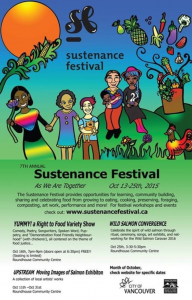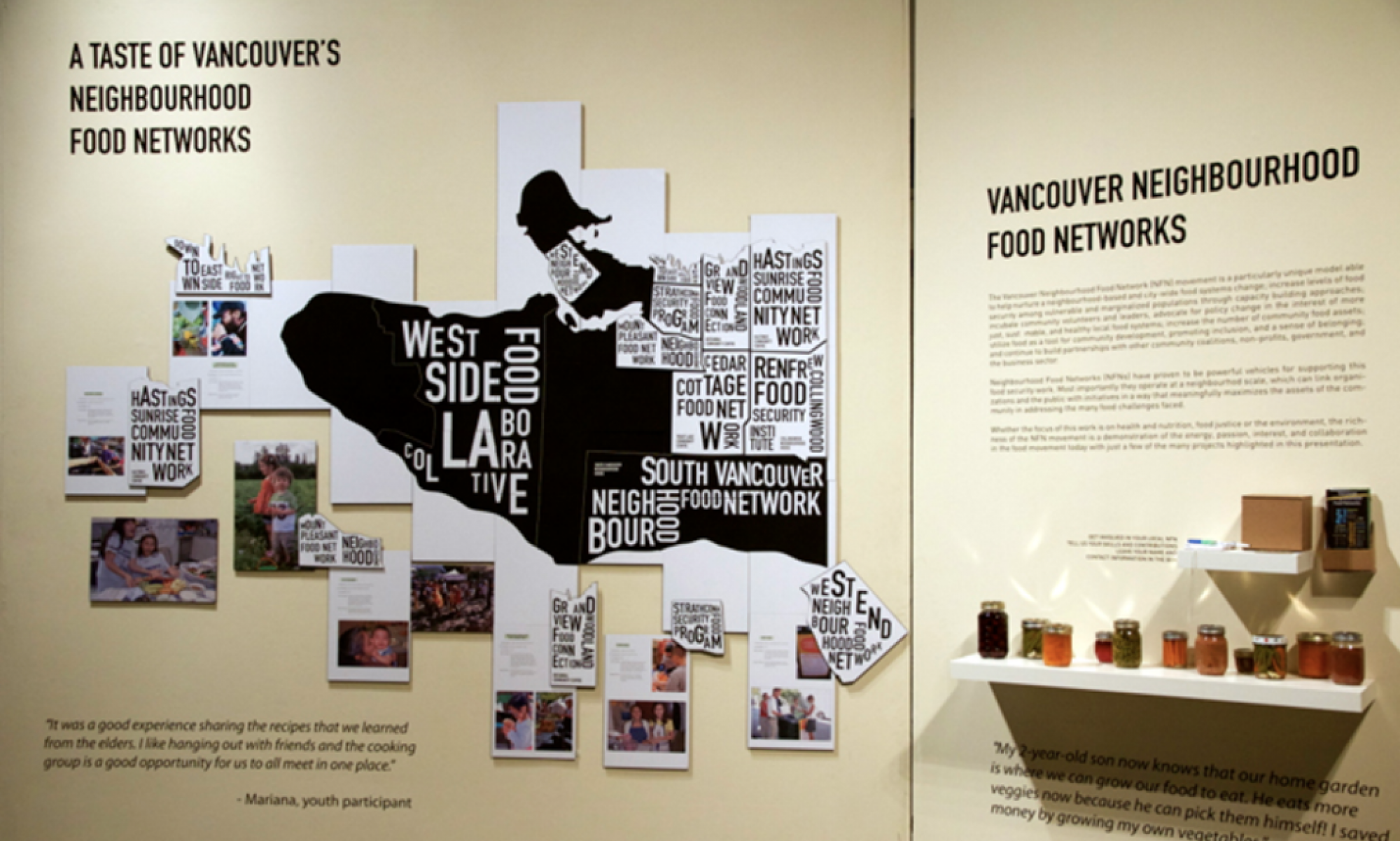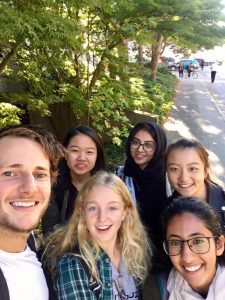“Global hunger isn’t about the absence of food; it’s about the presence of entrenched injustice.” – Ray Offenheiser
While the gross inequities of the global food system are starkly apparent and much discussed, what is often less visible, though equally pressing, are the inequities in our local communities. Who is our local food system for? Who isn’t it for? What is the “local food movement”, and who is deciding the direction in which it is moving? Whose inputs are left out of the equation? These questions speak to issues of equity and justice, and they ask us to reflect on the conditions of our own local food system. In recent years, the attempt to grapple with said inequities has been dubbed “food justice”. Food justice movements affect change in community food systems in part by bringing to the forefront voices which are frequently unheard or neglected. In creating a functional, sustainable and just local food system, it is vital there be participation and contribution from and inclusion of a wide variety of actors whom differ in class, income, gender, and race. Tackling issues of exclusion and marginalization then becomes paramount. It is from this point which we begin our work.
We are a group of six students who study in the faculty of Land and Food Systems and together we will be working on the Sustenance Festival project for this term. Our group consists of:
- Shazmeen Omar, majoring in Food, Nutrition and Health. Her interests include calligraphy, brush lettering, scrapbooking, reading, drinking tea etc.
- Wangzhiling (Sabrina) Wan, majoring in Nutrition Sciences. Her interests include books, films, music, traveling.
- Leighland Joyce, majoring in Global Resource Systems. He is interested in community development and issues of food sovereignty. His hobbies include cycling, making art and music, and film.
- Klara Huebsch, majoring in Global Resource Systems. Her interests include sustainable economic development and the emerging green economy. Her hobbies include playing piano, flow arts, and spending time in the outdoors.
- Sharon Yong, majoring in Food, Nutrition and Health. Her interests include travelling, exploring different countries and their various cultures. She also loves the outdoors and hopes to spend more of her remaining time in Vancouver exploring the beautiful nature it has to offer.
- Anwaar Baobeid, majoring in Food, Nutrition, and Health. Her interests include travelling and exploring new cities, as well as sketching, graphic design, and photography. She enjoys learning about different cultures, particularly related to the wide variety of ways that people cook and eat food around the world.
“Together we’ll be working on the Sustenance Festival project”
Group interests, goals, reasons for choosing project, and what we wish to gain from our experiences in LFS 350
Coming from different countries with diverse ethnic groups and races, we have been able to experience first-hand how food and culture are able to unite and at the same time create barriers between communities. The reason why our group is interested in community development in the food system is to identify ways to increase inclusivity in Vancouver’s food movement. We believe that the diversity within the food system should be celebrated and be a source of pride for people of all different backgrounds. Through this project, we hope to learn more about the Vancouver food system and what it is about; flaws and strengths included, but to also gain observational and critical thinking skills. We also hope to engage with community partners to learn about their perspective on the Vancouver food movement, the current barriers to participation, and how to use their insights to build a more diverse and inclusive food system in Vancouver. Most importantly, we wish to build relationships within the community. We chose this project because we believe it is extremely important to address marginalization within the food system and therefore hope to learn how to effectively communicate the process of building relationships with community partners.
Project Activities and Introduction to Community Organization
We will be working alongside the Vancouver Parks Board in the Sustenance Festival project. The Vancouver Park Board is a municipal body in Canada and part of their mission strives to develop, enliven, enhance, and promote arts, culture, and cultural diversity in Vancouver (City of Vancouver, 2017). This project is an inclusion process that involves a continuous relationship building between the Vancouver Park Board and the under-represented communities in Vancouver. As a team, our responsibilities would include documenting their research on the barriers of participation in the Sustenance Festival which grew out of the need to having conversations on Food Security in Vancouver. As stated in our first meeting with organizers of the festival, the glaring question that needed to be answered was, “Why is the food movement so white?”. They believe that the issues of marginalization and systemic racism needs to be addressed before hosting the festival again next year. As part of the relationship-building process, our task is to make a film documenting their process of engaging with various community partners to learn more on how to increase inclusivity in the food movement. This end product will then be used as a tool to create awareness in the larger Vancouver community.

“The Sustenance Festival grew out of the need to having conversations on Food Security in Vancouver”
First impressions
“Food justice is about people across all communities being able to have access to nutritious, safe and culturally acceptable foods. However, even in a city as developed as Vancouver, people are still suffering from food insecurity. It moved me when Rebecca and Brenda at Park Board said that they are using funding to build relationship with marginalized communities in order to improve inclusion instead of just holding a two-week grand festival, because not only there will not be such a big “outcome”, but there is also no guarantee that they can eventually succeed. They are doing this only because of their passion and care for the communities, and that made me reflect my own way of thinking as well.” -Sabrina
“We recently had our first meeting with the Sustenance Team (Brenda and Rachel). It was very exciting hearing about theirwork and vision of a more diverse food system. Considering that our project is focused on working with marginalized communities, Sirolli’s TED Talk about truly listening holds utmost importance. Not only will we listen to what these communities have to share about Vancouver’s food system, but also include them in building the documentation process. We will ask for their input on how they would like to be represented in our video.” – Klara
“During the initial stages, there was a lot of uncertainty involved as we were only given a slight glimpse of what the theme of the project was and relatively vague instructions on how to go about it. On the 20th of September, we were able to meet our community partners to introduce ourselves and learn more about how we could work with them. From the meeting, we learned that they were planning on taking a thoughtful approach on this festival. Part of it was by building relationships and facilitating meaningful dialogues with the leaders of 10 under-represented communities, which fell in line with the principles of the asset-based community development. As mentioned by LaDonna Redman in her Tedx Talk, this project’s focus is to promote food justice, in a way that the stories and food culture of under-represented communities are seen and heard, changing the scene of the local food movement. While feeling excited about the project, we couldn’t help but feel overwhelmed at the same time by the time restraint that we had. However, we are really looking forward to work through this together as a team and it will definitely be a great learning process for all of us.” – Sharon
“Walking into the meeting room, I felt unease and uncertainty, which continued to grow as the meeting proceeded. However, that uncertainty became a learning opportunity, allowing me to see beyond the walls of UBC. Although it was difficult to see the direction and final outcome of the project, what was constantly repeated and what I carried from our very first meeting was that the process in and of itself can be considered an outcome. The work that the Sustenance Festival has done over the past year while researching their lack of inclusivity paralleled and echoed Ernesto Sirolli’s words, to “shut up”, to “sit”, and to listen to the community rather than telling them what to do. This I believe is critical to the success of the festival in and representing the diverse community members in Vancouver as they are meeting with local people, connecting with them, and hearing their experiences related to the food movement.” – Anwaar
With all these burning questions in mind, we are excited to take on this community project by coupling it with lessons learned in class and how they apply to our day to day lives.
References
City of Vancouver. (2017). Arts and Culture. Retrieved from http://vancouver.ca/parks-recreation-culture/arts-and-culture.aspx
TEDxTalks. (2013, Mar 4) Food + Justice = Democracy: LaDonna Redmond at TEDxManhattan 2013. Retrieved from https://www.youtube.com/watch?v=ydZfSuz-Hu8
TEDxTalks. (2012, August) Want to help someone? Shut up and listen!: Ernesto Sirolli at TEDxEQChCh 2012. Retrieved from https://youtu.be/chXsLtHqfdM

